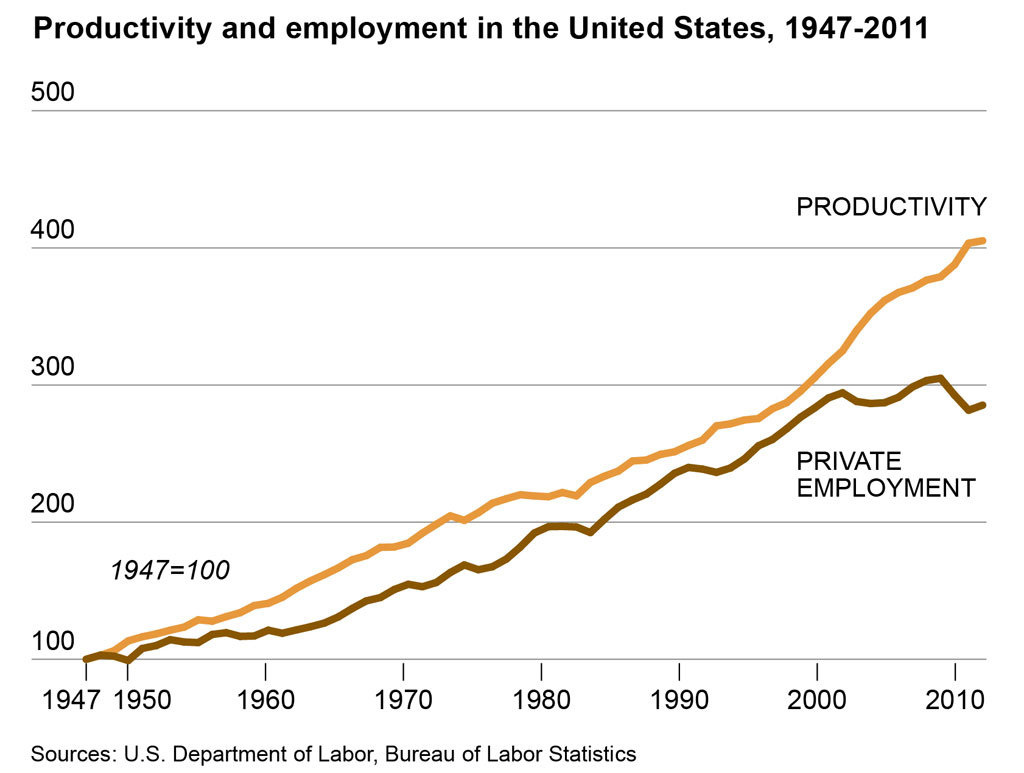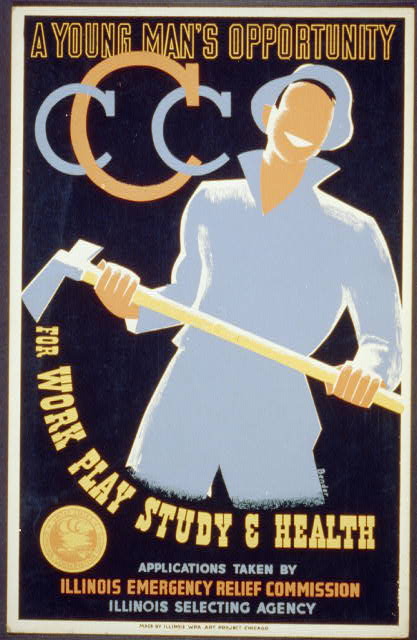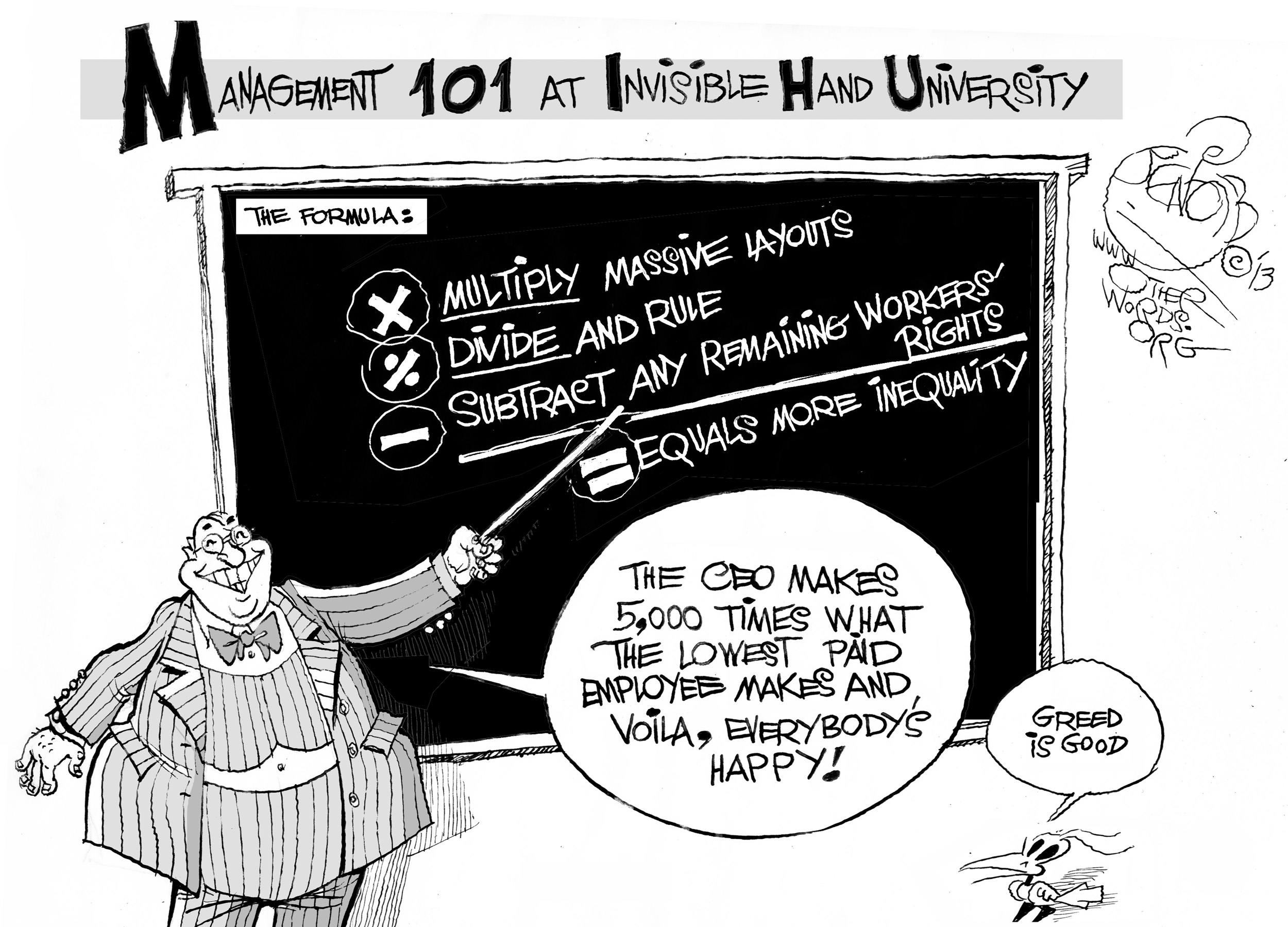|
The End of Meaningful Work: A World of Machines and Social Alienation
Featured in Zero Hedge Listed in The Reformed Broker Daniel Drew, 5/18/2015 Tweet Many activists are clamoring for a higher minimum wage. That's an admirable goal, but is that where the worst problem is? Even at the abysmally low wages of the present moment, we still have 938,000 people being turned away from McDonald's because there aren't enough McJobs. The real problem is the lack of meaningful work. In a world of machines and social alienation, meaningful work is as scarce as water in the drought-stricken California Central Valley. One cause of the employment crisis is relentless outsourcing to foreign countries. However, even more insidious has been the replacement of human workers by machines. For hundreds of years, the Protestant work ethic lauded hard work and efficiency as ideals to strive for. It's not easy to object to those principles. But what happens when efficiency means eliminating humans? It's doubtful the early Protestants ever imagined that could be a possibility. Even up to the present day, many view new technology and efficiency as the main drivers of human progress. For awhile, it seemed like this was indisputable. In his book Rise of the Robots, Martin Ford describes the 25 years after World War II as the "golden age" of the American economy. Productivity, employment, and wages were increasing in synchrony. As with many trends, economists assumed they would continue indefinitely. It was the glorious free market at work. Then it all came crashing down at the turn of the century.  This time, it really is different. The shift happened when machines transformed from mere tools to actual workers. Martin Ford explained, "In 1998, workers in the US business sector put in a total of 194 billion hours of labor. A decade and a half later, in 2013, the value of the goods and services produced by American businesses had grown by about $3.5 trillion after adjusting for inflation - a 42 percent increase in output. The total amount of human labor required to accomplish that was...194 billion hours. Shawn Sprague, the BLS economist who prepared the report, noted that 'this means that there was ultimately no growth at all in the number of hours worked over this 15-year-period, despite the fact that the US population gained over 40 million people during that time, and despite the fact that there were over thousands of new businesses established during that time.'"If this trend continues a few more years, it will be two lost decades, which means an entire generation has gone by with no net new jobs created. This might be somewhat permissible if the population had stagnated or declined, but with 40 million new people, it sets the stage for a national disaster. It is truly a new era. Ford confirmed, "There has never been a postwar decade that produced less than a 20 percent increase in the number of available jobs. Even the 1970s, a decade associated with stagflation and an energy crisis, generated a 27 percent increase in jobs. This new reality is nothing less than the end of progress and the Protestant work ethic. Efficiency can no longer be held up as something that is unambiguously good. The Protestants were wrong. There is something much more important than efficiency: survival. In a world without sufficient work, some have argued in favor of a broader social safety net. In a New York Times op-ed called "Sympathy for the Luddites," Paul Krugman said more education is not the answer, and it never was. Indeed, education is probably the biggest national scam in history. Nothing turns the average person into a debt slave the way college does. Krugman said instead of more education, we should provide everyone with a basic minimum income - kind of like Social Security, except for all ages. Krugman claims it's the "only way" to have a middle-class society. He's not the first one to suggest this. Ironically, the biggest libertarians of all, economists Friedrich Hayek and Milton Friedman, agreed that a basic universal income was prudent policy. Another proposed solution is broad-based capital ownership. The basic concept is to mimic the way rich kids get an inheritance. Everyone would get an inheritance, and it would be courtesy of Uncle Sam. The initial implementation of such a project would require an enormous one-time expenditure, probably $100 trillion if the individual amounts were meaningful in any sense. It would be like a lump sum version of Social Security. It would be the ultimate quantitative easing, possibly the QE Infinity that some have referred to. Unlike prior quantitative easings, this one would actually benefit the average person because everyone would be a capitalist. The idea for widespread capital ownership can be traced to the Founding Fathers. George Washington, Thomas Jefferson, John Adams, and James Madison all believed men should have their own farms and be self-sustaining citizens. Abraham Lincoln supported the idea with the Homestead Act of 1862, which granted citizens 160 acres of government land to cultivate.  In his book The Citizen's Share, economic sociologist Joseph Blasi said, "business capital has replaced land as the source of wealth creation." Blasi told Fortune Magazine, "We could have a future where technology creates a low feudal serf class - people with low wages or flat wages or high structural unemployment. Or, we could have a future where we have a smaller workweek and citizens broadly have more capital ownership." Blasi explained to PBS, "John Adams favored distribution of public lands to the landless to create broad-based ownership of property, then the critical component of business capital in the largely agricultural U.S. Current levels and trends in inequality would almost certainly have terrified the founders, who believed that broad-based property ownership was essential to the sustenance of a republic."James Madison warned that inequality in property ownership would "subvert liberty" by fostering class warfare. Blasi raises compelling points about the Founders. This information completely defies the critics who think socialist capital redistribution is inherently Un-American. As the Founding Fathers argued, such socialist policies are necessary to ensure a republic where the "common man" is not merely a concept, but a reality as well. Nonetheless, the compelling scheme of broad-based capital ownership is not without problems. First of all, there is the whole feasibility issue. If we want to give every American a stock portfolio, it would require an unprecedented one-time expense. Second, unless there were some kind of "reload" option, it could create a society where there are no second chances. Investing is basically a gamble, and if you blew your entire government inheritance on a biotech stock, would you be permanently homeless? In the new dystopia, you wouldn't be able to "work" to get the money back because the machines would do all the labor. The money would be lost forever. On the other hand, this reality might make people extremely risk-averse, and we could have an even more severe situation than we have now, with government bonds trading at negative interest rates. Whether it's guaranteed income like Social Security or a broad-based capital ownership program, what both "handout" solutions fail to do is restore the dignity of work. Even if work is routine or inefficient, the mere act of working and contributing to society creates meaning in the worker's life. No one wants to receive a handout. People want to feel like they earned it. This is what workers in the Civilian Conservation Corps felt like during The Great Depression.  The History Channel explains, "Formed in March 1933, the Civilian Conservation Corps, CCC, was one of the first New Deal programs. It was a public works project intended to promote environmental conservation and to build good citizens through vigorous, disciplined outdoor labor. Close to the heart of President Franklin D. Roosevelt, the CCC combined his interests in conservation and universal service for youth. He believed that this civilian 'tree army' would relieve the rural unemployed and keep youth 'off the city street corners.'"With 938,000 people being turned away from McDonald's jobs and riots in the streets, there has never been a time since The Great Depression when we could use something like the Civilian Conservation Corps as much as now. Even an ambitious work project like this does not eliminate the threat of machines whose primary advantage is efficiency. Are human beings inefficient? You better believe it. Are we loud, obnoxious, smelly, and unsanitary creatures that are huge liabilities? Yes we are. But for thousands of years, those were accepted realities. Only now, when mechanical options present themselves, are these realities being questioned. Nothing captures the humans vs. machines debate as well as Agent Smith's interrogation of Morpheus in the 1999 movie The Matrix. Ironically, the film was released at the turn of the century, just when efficiency was about to diverge from human employment. In eerie prescience, Agent Smith calls it the peak of our civilization. According to him, human beings are like the dinosaurs, about to be wiped out and replaced by machines. He is dressed like the MBA automatons that dominate corporate America. Sometimes, it's not clear if this is entertainment or reality. One writer named Hayley Krischer shared a frightening story about her five-year-old daughter:When our children don't even know if a sunset is real, we have a problem. What happens when we can't even tell if a human is real? Aiko Chihira is the name of the new receptionist at the Mitsukoshi Nihonbashi department store in Tokyo. She's not made from the same stuff as you and me. One way we can halt creepy, degrading mechanical intrusions into our social experience is through a new series of incentives. In the same way we have "sin taxes" on alcohol and tobacco products, we could have a sin tax on companies that use a machine to completely eliminate human interaction, which would be defined as face-to-face interaction or vocal communication, but not text or pictures. Conversely, we could provide subsidies for companies that create new human interaction in their business transactions. For example, banks that use ATMs when human tellers are available would have to pay the technological sin tax. If they created a new policy where all ATMs were shut down during normal business hours, they would have to hire more tellers, which would boost employment and create more human interaction. Both of these results would be good for society. The goal of these policies would be to eliminate the increasing mechanical alienation that pervades every aspect of life. Anyone who has been to a party where everyone was using a cell phone can attest to this reality. Susan Greenfield, a neuroscientist at Oxford University, says modern technology is already rewiring the way the human brain works. UCLA scientists found that sixth-graders who went five days without any digital screen exposure did substantially better at reading human emotions than sixth-graders from the same school who spent hours every day looking at their electronic devices. When a New York Times reporter asked Steve Jobs how his kids liked the iPad, he said, "They haven't used it. We limit how much technology our kids use at home." It's clear that technology has intruded far enough into our lives. If we do not act now, we will lose our ability to communicate with each other and the ability to enjoy meaningful employment. We will degenerate into an idiocracy. If you agree, you can sign this petition to President Obama to promote the responsible use of technology in the work environment. Despite the clear data and obvious dangers of being replaced by machines, being a Neo-Luddite is not easy. Critics abound. The Information Technology & Innovation Foundation hands out annual Luddite Awards to make fun of tech critics who wish to "smash the engines of innovation." According to them, technology is unambiguously good; it is "the wellspring of human progress." Because nothing says "progress" like no net new jobs created in 15 years when the American population increased by 40 million. There is nothing unscientific about demanding a technology policy that promotes moral responsibility. If science has bioethics, technology can have technoethics. Some critics will argue that we shouldn't create incentives with sin taxes because it interferes with the "free market." The free market evangelists at Forbes write columns that are filled with quotes like, "The market always wins, you cannot stop it." It's simply not true. The free markets brought us slavery, monopolies, dangerous working conditions, and unsafe consumer products. Contrary to what you heard from Gordon Gekko, greed is not good, and it does not work. The backwards belief that greed somehow benefits society with one giant invisible handshake is one of the greatest lies ever perpetuated by the economics profession.  Even Adam Smith, the author of The Wealth of Nations and the one who popularized the Invisible Hand, said, "When the regulation, therefore, is in support of the workman, it is always just and equitable; but it is sometimes otherwise when in favour of the masters...No society can surely be flourishing and happy, of which the far greater part of the members are poor and miserable." Economist Joseph Stiglitz said, "The reason the Invisible Hand often seemed invisible was because it wasn't there."The free market has certainly failed us. We are left with a society that has no work to offer 40 million new citizens. We prefer to spend most of our days staring at screens rather than at actual human faces. We jump at the chance to avoid human contact. Text messaging is basically a regression to an earlier mode of communication: the telegraph. Instead of Morse code, we use emoticons - artificial digital faces to express emotions we can barely convey across our actual faces. Now, it is considered an accomplishment rather than an abomination to create a humanoid robot receptionist. The free market brought us slavery. Now, it wants to purge everyone of our humanity and make us all more like robots. Am I a silly Neo-Luddite? Why don't you ask Aiko Chihira for her opinion. She might not have an opinion now, but she will some day. |